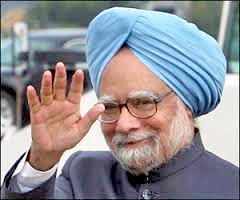New Delhi, Apr 1: In a relief to former Prime Minister Manmohan Singh, the Supreme Court today stayed the trial court order summoning him as accused in a case pertaining to grant of Talabira-II coal block in Odisha in 2005 to Aditya Birla group company Hindalco.

"We issue notice on all six petitions. The trial court order shall remain stayed," a bench of justices V Gopala Gowda and C Nagappan said after hearing arguments by Sibal, who represented the former Prime Minister, and other lawyers in the case.
82-year-old Singh's daughters, Upinder Singh and Daman Singh, were present in the court during the proceedings.
The bench also stayed the proceedings before the trial court and issued notice to the Centre on a plea challenging constitutional validity of section 13 (1)(d)(iii) of the Prevention of Corruption Act.
The other three summoned as accused are Hindalco, Shubhendu Amitabh and D Bhattacharya, its officials. All the six were summoned by Special CBI Judge Bharat Parashar to appear before the court on April 8.
"I must confess that I have not been able to find out what is the illegal act done by the petitioner in the case," Sibal said at the outset of the 35-minute proceedings.
Sibal said it is not an illegal act to allot a mine contending that the administrative acts of the Prime Minister cannot be faulted on the ground that he did not follow the recommendations or procedures adopted by the screening committee.
He also referred to the earlier Supreme Court judgement by which all the coal block allocations were quashed on the ground that screening committee procedures were illegal.
"The trial court, in its order, says that you did not follow the screening committee and this is contrary to law," Sibal said, adding that the order summoning the PM does not stand the scrutiny of "public reasoning".
He also said that the trial court order does not deal with the provisions on requirement of prior sanction to prosecute a public servant under the criminal procedure code (CrPC) and the Prevention of Corruption Act.
Referring to the essential ingredients of an offence, Sibal said that "there is no reference of meeting of minds to commit an illegal act by the accused persons".
During the hearing, the bench asked the counsel for Singh to satisfy it on provisions relating to grant of sanction to prosecute a public servant.
Sibal referred to various Supreme Court judgements and said "even if I am the Coal Minister at the relevant time, I don't lose the status of the Prime Minister who has got plenary power. Everyday, I take decisions as minister and reject the advice, should I be sent to Tihar Jail?".
There has to be a meeting of minds to do a criminal act with regard to allocation of Talabira coal mines to a private firm, he said, adding, "Where is the criminal conspiracy? Is it an offence to grant coal mines to a private sector company?"





Comments
Add new comment